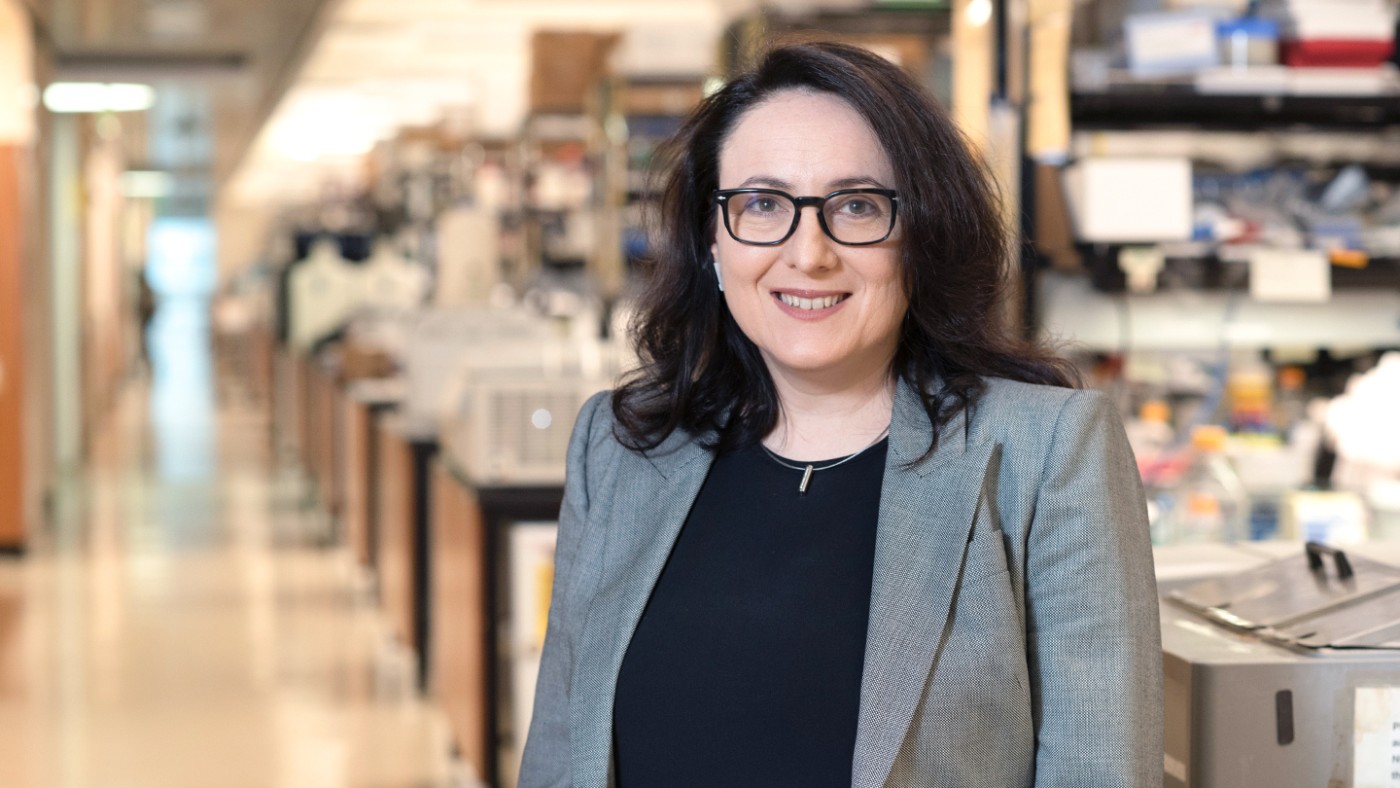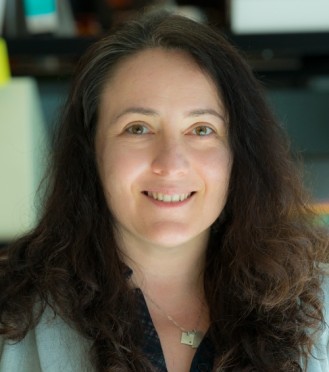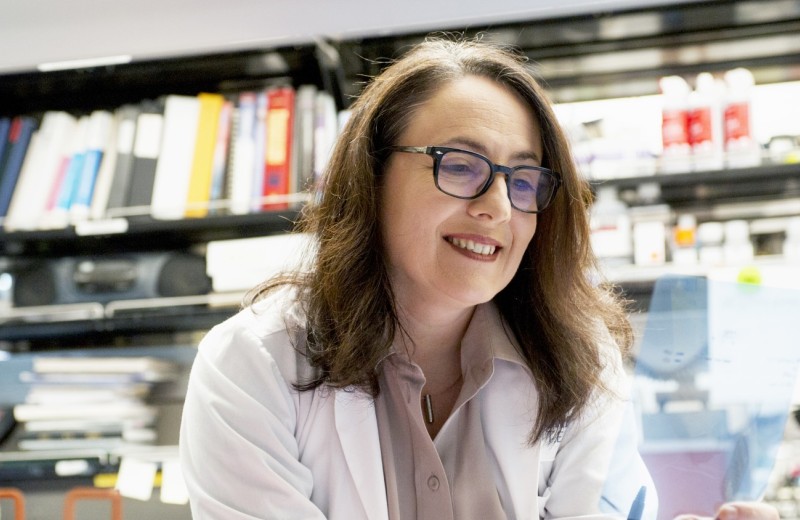Gladstone NOW: The Campaign Join Us on the Journey✕

Katerina Akassoglou is named a fellow of the National Academy of Inventors for her long track record of discovery and innovation.
Katerina Akassoglou, PhD, senior investigator at Gladstone Institutes, has been named a fellow of the National Academy of Inventors (NAI). Election to NAI is the highest professional distinction given solely to academic inventors.
This prestigious recognition is a testament to Akassoglou’s long track record of discovery and innovation. She has made seminal discoveries on the relationship between the brain, immune, and vascular systems. Her research has illuminated the toxic role of blood proteins in neurological diseases and has led to the development of therapeutics to treat these diseases.
Akassoglou holds 10 issued US patents and several pending patent applications, many of which have been licensed by biomedical companies. She co-founded the startup Therini Bio with technology spun out from her laboratory for the clinical development of these discoveries.
“Katerina exemplifies Gladstone’s commitment to innovation, invention, and translational research that has the potential to benefit patients,” says Gladstone President Deepak Srivastava, MD. “We are incredibly proud that she has been recognized with this well-deserved honor.”
Akassoglou was named an NAI Fellow for demonstrating a highly prolific spirit of innovation in creating or facilitating outstanding inventions that have made a tangible impact on the quality of life, economic development, and welfare of society.
“I am truly honored to be elected to the National Academy of Inventors in recognition of our discoveries and grateful for the support of academic innovation,” says Akassoglou, who is also director of the Center for Neurovascular Brain Immunology at Gladstone and UCSF, and professor of neurology at UC San Francisco. “Election to the NAI further encourages us to pursue challenging problems in biology and medicine to develop urgently needed treatments for devastating human diseases.”
Akassoglou’s research team discovered that blood proteins are toxic when they enter the brain in neurological diseases because they induce inflammation and inhibit repair. They showed that in neurodegenerative diseases—including multiple sclerosis and Alzheimer’s disease—the blood-clotting protein fibrin leaks through the blood-brain barrier into the brain. There, it hijacks receptors on nervous system cells and can activate microglia (the brain’s resident immune cells), triggering inflammation and, eventually, nerve damage.
With this knowledge, Akassoglou invented an antibody to neutralize the toxic effects of blood in disease. This first-in-class immunotherapy targets fibrin and prevents it from activating immune cells, but doesn’t impair its beneficial blood clotting function. In mouse models of Alzheimer’s disease, the antibody prevents neurodegeneration, even when administered after mice have already developed accumulations of amyloid proteins in the brain, a hallmark of disease. Similarly, in a mouse model of multiple sclerosis, the fibrin antibody prevented paralysis, nerve damage, and inflammation. Her lab also developed a fibrin therapeutics platform and, together with collaborators, discovered small molecule drugs to block the deleterious effects of fibrin on nervous system cells with potent protection from neurodegeneration.
Akassoglou is among 164 distinguished academic inventors from 116 universities and research institutes elected to the NAI this year. She becomes the second Gladstone researcher to be an NAI Fellow, with Senior Investigator Jennifer Doudna, PhD. An induction ceremony for newly elected NAI Fellows will be held at the organization’s 11th annual meeting in June 2022 in Phoenix, Arizona.
The program currently has 1,403 Fellows worldwide representing more than 250 universities and research institutes. Collectively, fellows hold more than 42,700 issued US patents, which the NAI estimates have generated more than $3 trillion in revenue and created more than 1 million jobs.
For Media
Julie Langelier
Associate Director, Communications
415.734.5000
Email
About Gladstone Institutes
Gladstone Institutes is an independent, nonprofit life science research organization that uses visionary science and technology to overcome disease. Established in 1979, it is located in the epicenter of biomedical and technological innovation, in the Mission Bay neighborhood of San Francisco. Gladstone has created a research model that disrupts how science is done, funds big ideas, and attracts the brightest minds.
About the National Academy of Inventors
The National Academy of Inventors is a member organization comprising U.S. and international universities, and governmental and non-profit research institutes, with over 4,000 individual inventor members and Fellows spanning more than 250 institutions worldwide. It was founded in 2010 to recognize and encourage inventors with patents issued from the United States Patent and Trademark Office (USPTO), enhance the visibility of academic technology and innovation, encourage the disclosure of intellectual property, educate, and mentor innovative students, and translate the inventions of its members to benefit society. The NAI has a close partnership with the USPTO and is one of three honorific organizations, along with the National Medals and National Inventors Hall of Fame, working closely with the USPTO on many discovery and innovation support initiatives. The NAI publishes the multidisciplinary journal, Technology and Innovation.
Featured Experts
Six Gladstone Scientists Named Among World’s Most Highly Cited Researchers
Six Gladstone Scientists Named Among World’s Most Highly Cited Researchers
The featured scientists include global leaders in gene editing, data science, and immunology.
Awards News Release Corces Lab Doudna Lab Marson Lab Pollard Lab Ye LabBringing Modern Science to Vitamin Biology: Isha Jain Wins NIH Transformative Research Award
Bringing Modern Science to Vitamin Biology: Isha Jain Wins NIH Transformative Research Award
Leveraging modern scientific tools and techniques, Jain intends to transform our understanding of the critical roles that vitamins play in health and disease.
Awards News Release Cardiovascular Disease Jain Lab MetabolismKaterina Akassoglou Receives Zenith Fellows Award to Advance Alzheimer’s Research
Katerina Akassoglou Receives Zenith Fellows Award to Advance Alzheimer’s Research
Akassoglou has opened doors to understanding how the blood protein fibrin is involved in Alzheimer’s and other neurodegenerative diseases.
Awards News Release Alzheimer’s Disease Center for Neurovascular Brain Immunology Akassoglou Lab




